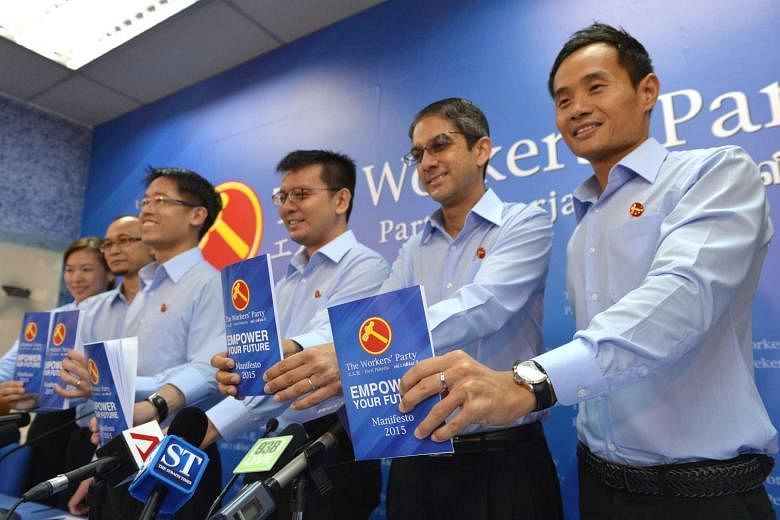The Workers' Party (WP) is proposing a national minimum wage that is pegged to the average expenditure of a four-person household on essential items such as food and clothing.
The party said such a move, which was listed in its election manifesto unveiled yesterday, will help unleash hidden potential within financially strapped families, among other benefits.
"If wages are too low, it could have a potential issue of a poverty cycle within the family...
"Within a poor family, there could be the next Mark Zuckerberg, the next Sim Wong Hoo," said Mr Leon Perera, a WP potential candidate, in reference to the founders of social networking website Facebook and Singapore multimedia firm Creative Technology respectively.
Launched yesterday at the WP headquarters by a six-member panel, the opposition party's 2015 election manifesto is a 48-page document containing some 130 policy ideas on issues such as immigration, the economy, healthcare and education.
-
WP's manifesto at a glance
-
IMMIGRATION
• Foreign workforce numbers can be kept constant if a target 1 per cent annual growth in resident workforce is achieved. This can be done by encouraging more women and senior citizens to join the labour market through targeted training and job-matching schemes and job-redesign.
• Foreign spouses of Singaporeans should also be given priority when applying for citizenship, as part of a pro-Singaporean immigration policy. This is because marriages between Singaporeans and non-Singaporeans are becoming increasingly common, and integration is easier when there are family ties.
• Maintain 10 per cent of total land area as reserves for future generations, instead of 4 per cent. This would ensure a better quality of life and preserve urban heritage to root national identity.
ECONOMY
• Set up an Economic Security Fund (ESF), a mandatory unemployment insurance scheme similar to those overseas. Employers and employees will contribute in equal parts an additional 0.1 per cent of basic salary into the ESF. Retrenched workers can get 40 per cent of their last-drawn salaries for six months, capped at the prevailing median monthly wage.
• Payouts for the Silver Support Scheme, unveiled in this year's Budget and aimed at boosting the incomes of the poorest 20 per cent to 30 per cent of Singaporeans aged 65 and older, should be adjusted for inflation at the start of every government term. Payouts should be made every month instead of every three months.
• A national minimum wage pegged to Average Household Expenditure on Basic Needs for a four-person household - which was $1,250, according to the 2013 Household Expenditure Survey - should be established. WP potential candidate Leon Perera said the minimum wage should start at 80 per cent of that figure and be introduced in a "phased, deliberate manner" to gauge its impact on job creation.
SOCIETY
• Keep the number of casinos in Singapore at two by implementing a permanent ban on new casino licences after the current 10-year moratorium expires next year. Annual casino entry passes should no longer be issued so as to discourage frequent gambling.
When asked for a specific figure, Mr Perera suggested that the minimum wage start at 80 per cent of $1,250, which is the Average Household Expenditure on Basic Needs for a four-person household based on the 2013 Household Expenditure Survey, conducted every five years.
He added his take-away from studies showing that minimum wage led to unemployment was that it should not be set too high.
Hence, the WP would increase the minimum wage over a period of time if needed and introduce it in a "very deliberate, very calibrated manner so that we can gauge the impact on net job creation".
The Government has argued that its combination of wage subsidies and skills training was more effective than a national minimum wage to raise incomes at the low end.
The Progressive Wage Model (PWM), which was launched in 2012 and prescribes a minimum wage in certain industries, has been implemented in the cleaning industry and will apply to the security sector next year.
Mr Perera said the PWM was a step in the right direction but added that a national minimum wage was still necessary as it would apply to more people.
Such a move would not only help the poor but also spur productivity as it "may put pressure on employers to invest their capital in training to increase the productivity of the lower-paid workers", he said.
Higher salaries could also attract older Singaporeans and women in their 30s and 40s to re-enter the workforce, he said.
"A higher wage may actually help to induce some of them, those who are in that part of the labour market where wages are lower, to make it more worthwhile for them to come back to the labour force."
Improving labour force participation rates among Singaporean senior citizens and women is also part of the WP's proposal to achieve a 1 per cent annual growth in the resident work force, said Dr Daniel Goh, a WP candidate who was also on the panel yesterday.
Based on the party's calculations, this would lead to a projected population of 5.8 million in 2030, negating the Government's planning parameter of 6.9 million, Dr Goh said.
He added that foreign spouses of Singaporeans should be given priority for citizenship as they assimilate more naturally through family ties and marriages between Singaporeans and non-Singaporeans are on the rise.
"In line with our focus on the Singaporean core, we believe the best way to integrate first-generation immigrants is through the family."
Yesterday's panel also comprised Non-Constituency MP Gerald Giam, corporate lawyer He Ting Ru, librarian Mohamed Fairoz Shariff, and voluntary welfare organisation manager Kenneth Foo. Both Mr Fairoz and Mr Foo have not been formally introduced by the party as candidates but are expected to be unveiled today or tomorrow.
Other proposals include making the Silver Support payouts - meant for the poorest elderly - inflation adjusted, and lowering the Central Provident Fund payout eligibility age from 65 to 60. Several proposals found in the 2011 manifesto, such as abolishment of the Internal Security Act, were kept.
Yesterday, the WP also launched a mobile app that collates news on its activities and candidates.
Mr Giam, who was leading the panel, said the app will continue to be updated after the elections and the aim is for it to be a permanent source of information on the party. He declined to reveal how much was spent to develop the app.
The manifesto can be downloaded from the party's website at www.wp.sg/manifesto.
•Additional reporting by Tham Yuen-C


